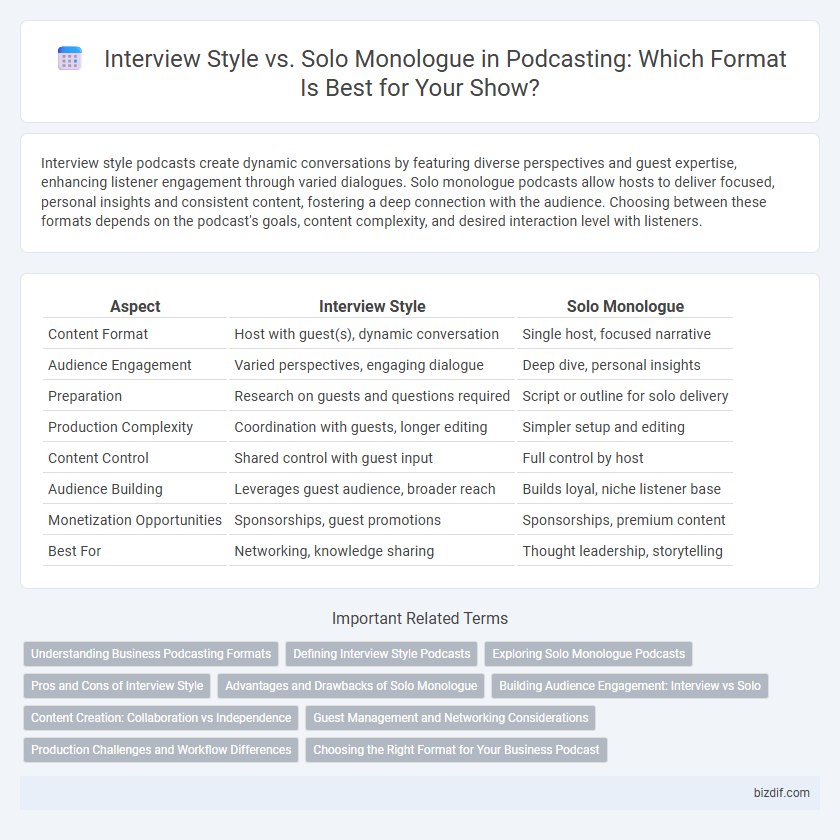Interview style podcasts create dynamic conversations by featuring diverse perspectives and guest expertise, enhancing listener engagement through varied dialogues. Solo monologue podcasts allow hosts to deliver focused, personal insights and consistent content, fostering a deep connection with the audience. Choosing between these formats depends on the podcast's goals, content complexity, and desired interaction level with listeners.
Table of Comparison
| Aspect | Interview Style | Solo Monologue |
|---|---|---|
| Content Format | Host with guest(s), dynamic conversation | Single host, focused narrative |
| Audience Engagement | Varied perspectives, engaging dialogue | Deep dive, personal insights |
| Preparation | Research on guests and questions required | Script or outline for solo delivery |
| Production Complexity | Coordination with guests, longer editing | Simpler setup and editing |
| Content Control | Shared control with guest input | Full control by host |
| Audience Building | Leverages guest audience, broader reach | Builds loyal, niche listener base |
| Monetization Opportunities | Sponsorships, guest promotions | Sponsorships, premium content |
| Best For | Networking, knowledge sharing | Thought leadership, storytelling |
Understanding Business Podcasting Formats
Interview style podcasts foster dynamic conversations by featuring industry experts, offering diverse perspectives that enhance audience engagement and credibility. Solo monologue formats provide authoritative insights through focused storytelling or expert opinions, establishing a personal connection with listeners. Understanding these business podcasting formats helps brands tailor content to audience preferences, driving better marketing outcomes and thought leadership positioning.
Defining Interview Style Podcasts
Interview style podcasts feature dynamic conversations between a host and one or more guests, creating diverse perspectives and engaging dialogue. This format enhances listener engagement through interactive storytelling, expert insights, and real-time reactions. Popular in genres like journalism, education, and entertainment, interview podcasts build credibility and foster community by showcasing authentic voices.
Exploring Solo Monologue Podcasts
Solo monologue podcasts offer creators complete control over content, enabling deep dives into niche topics without guest constraints. This format fosters a strong personal connection with listeners, as hosts share unfiltered thoughts and expertise. Consistency and authenticity in solo shows often lead to loyal audience growth and enhanced brand authority in podcasting.
Pros and Cons of Interview Style
Interview-style podcasting offers dynamic conversations that bring diverse perspectives and expert insights, enhancing listener engagement through interactive dialogue. It requires coordinating schedules and managing varying guest speaking skills, which can introduce unpredictability and complexity in production. This format excels at fostering relatable content and networking opportunities but may limit creative control compared to solo monologue podcasts.
Advantages and Drawbacks of Solo Monologue
Solo monologue podcasts offer complete creative control, enabling hosts to deliver focused content without interruptions or scheduling conflicts, which enhances consistency and personal connection with the audience. However, the lack of guest perspectives can limit diversity of ideas and reduce dynamic engagement, potentially making episodes less compelling over time. Maintaining listener interest relies heavily on the host's ability to articulate insights clearly and sustain energy throughout the monologue.
Building Audience Engagement: Interview vs Solo
Interview-style podcasts foster audience engagement by featuring dynamic conversations that introduce diverse perspectives and relatable guest stories, enhancing listener connection and retention. Solo monologue podcasts build intimacy and authority through consistent, focused content that encourages deep audience trust and regular interaction. Choosing interview formats can boost engagement through varied voices, while solo episodes excel in establishing a strong personal brand presence.
Content Creation: Collaboration vs Independence
Interview-style podcasts foster dynamic content creation through guest expertise and interactive dialogue, enriching audience engagement with diverse perspectives. Solo monologue podcasts emphasize independence, allowing creators full control over narrative voice and content direction, which cultivates a deep personal connection with listeners. Both formats leverage unique strengths in podcasting, where collaboration can enhance breadth while solo efforts highlight individual creativity and consistency.
Guest Management and Networking Considerations
Interview style podcasts enhance guest management by requiring detailed scheduling, research, and personalized communication to build rapport and ensure insightful conversations. Solo monologue formats simplify guest logistics but limit networking opportunities and audience diversity, potentially affecting content richness and reach. Effective podcast growth often benefits from interview approaches, fostering valuable industry connections and expanding audience engagement through diverse perspectives.
Production Challenges and Workflow Differences
Interview-style podcasts require coordinating multiple guests, managing remote recording quality, and balancing diverse voices, which increases production complexity and editing time. Solo monologues offer streamlined workflows with fewer audio tracks and simplified scripting, allowing for faster production but demanding strong content creation and vocal engagement skills. Both styles pose unique challenges in maintaining listener interest and ensuring smooth episode flow through tailored post-production approaches.
Choosing the Right Format for Your Business Podcast
Selecting the right podcast format influences audience engagement and content delivery effectiveness. Interview-style podcasts foster dynamic conversations and diverse perspectives, ideal for businesses seeking to build authority and network with industry experts. Solo monologues allow for focused messaging and personal branding, providing control over content and deeper connection with listeners through consistent voice and expertise.
Interview Style vs Solo Monologue Infographic

 bizdif.com
bizdif.com